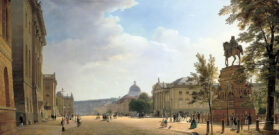For Hegel, change needed to build on earlier achievements and learn from past failures.
Max Skjönsberg
3
book reviews
&
classics
by
Max Skjönsberg.
Oct 25, 2023
The philosophy of the modern state contained in Reflections made people rethink what it meant to be a Whig.
Jun 1, 2023
Robin Douglass offers a redeeming interpretation of one of the most scandalous books of the Enlightenment: Mandeville’s Fable of the Bees.
Max Skjönsberg is Assistant Professor of Humanities in the Hamilton Center for Classical and Civic Education at the University of Florida.


